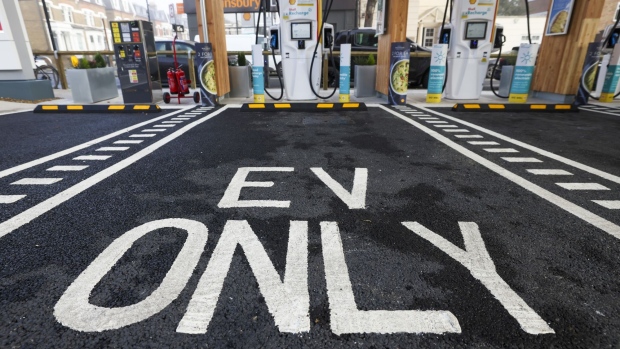Nov 17, 2022
Electric Cars to Pay Road Tax in Britain From 2025
, Bloomberg News

(Bloomberg) -- The UK is set to introduce road taxes on electric cars from 2025, Chancellor of the Exchequer Jeremy Hunt said, ending an exemption that was intended to spur adoption of zero-emissions vehicles.
EVs will no longer be exempt from vehicle excise duty, Hunt said during Thursday’s Autumn Statement as he unveiled a series of tax rises and spending cuts designed to plug a £55 billion ($65 billion) hole in Britain’s public finances.
https://t.co/SwVLpP1Sc2 pic.twitter.com/sQj3IJTV0Y
— Bloomberg UK (@BloombergUK) November 17, 2022
The chancellor said that EVs will still have lower company car tax rates and the government will limit rate increases to one percentage point a year for three years from 2025.
Read More: UK’s Floundering Car Industry Is Poised for Another EV Setback
The UK plans to end the sale of new cars powered only by gasoline and diesel engines from 2030, and carmakers have long asked for incentives to spur the adoption of electric vehicles. The phasing out of the road tax exemption follows the slashing of electric vehicle grants last year.
“The prospect of additional running costs will drive more would-be buyers away from EVs when other incentives are being scrapped and high energy bills are eroding the advantages of going electric,” said Ian Plummer, commercial director at online marketplace Auto Trader Group Plc.
The measures announced Thursdays will “unduly penalize” new, and more expensive, vehicle technologies, the Society of Motor Manufacturers and Traders said in a statement.
“We recognize that all vehicle owners should pay their fair share of tax, however, the measures announced today mean electric car and van buyers –- and current owners -- will face a significant uplift” in vehicle excise duties, said Mike Hawes, the group’s chief executive officer. “We need a framework that encourages consumers and businesses to buy electric vehicles.”
(Updates with comment from SMMT in sixth paragraph.)
©2022 Bloomberg L.P.


